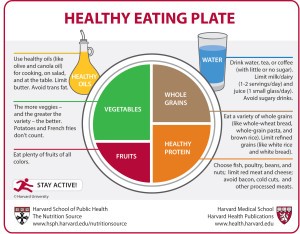HEALTHY EATING PLATE, THE GUIDE TO HEALTHY EATING THE UNIVERSITY OF HAVARD
Antioxidant Supplements
Supplements Vitamins

Nutrition experts at Harvard School of Public Health, in collaboration with Harvard Health Publications, gave rise to a guide for a healthy diet, called "Healthy Eating Plate". This guide is based "solely on the best available scientific knowledge and has not been subjected to any political or commercial pressure from the lobbies of the food industry."
The aim of the Harvard School of Public Health Nutrition is to provide real-time information on diet and nutrition to doctors, health professionals, and the public. The information does not form Reference intervalsa no brand, nor is it promoted any product in particular.
The question to the experts they propose to answer is: how can you have a healthy and balanced meal?
Here is a summary of the main rules to follow:
1) Fill half your plate with vegetables and fruits. Greater is the color and the greater the variety in this part of the plate, the better. Potatoes do not count as vegetables because they are high in fast-digesting starches, or with the same roller coaster effect in blood sugar and insulin, such as white bread and sweets. These peaks, in the short term can lead to hunger and overeating, and in the long term, to weight gain, type 2 diabetes and other health problems.
2) Book a quarter of your plate with whole grains. Refined grains, in fact, have a more complicated effect on blood sugar and insulin.
3) Put a healthy source of protein in a quarter of your plate: fish, chicken, beans, nuts, eggs .... Limit red meat beef, pork and lamb and avoid processed meat, bacon, sausages, and the like: eat regularly, even small amounts of these foods increases the risk of heart disease, type 2 diabetes and colon cancer.
4) Use healthy vegetable oils: olive oil, canola, soy, corn, sunflower, peanut ... Limit the butter.
5) Drink water, coffee or tea. Complement your meal with a glass of water, or a cup of tea or coffee (with little or no sugar). Limit milk and dairy to 1-2 servings per day, since a high consumption is associated with an increased risk of prostate cancer and ovarian cancer. Limit sugary drinks, which provide a lot of calories and virtually no other nutrients.
6) Stay active. The red figure that crosses the placemat is a reminder: stay active is key to weight control. Equally important as a healthy diet with modest portions.
Source: Harvard University
Antioxidant Supplements
Supplements Vitamins
